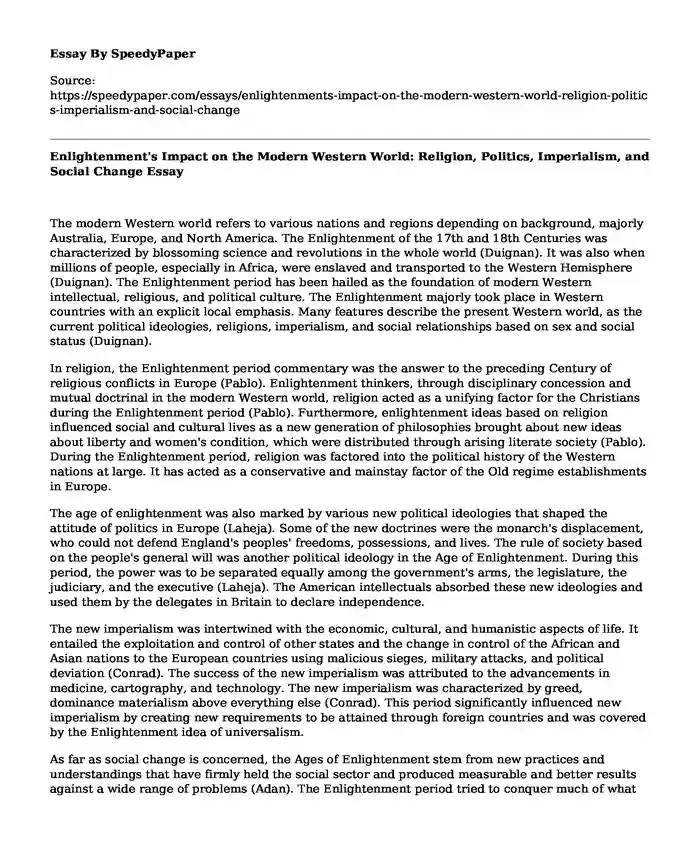The modern Western world refers to various nations and regions depending on background, majorly Australia, Europe, and North America. The Enlightenment of the 17th and 18th Centuries was characterized by blossoming science and revolutions in the whole world (Duignan). It was also when millions of people, especially in Africa, were enslaved and transported to the Western Hemisphere (Duignan). The Enlightenment period has been hailed as the foundation of modern Western intellectual, religious, and political culture. The Enlightenment majorly took place in Western countries with an explicit local emphasis. Many features describe the present Western world, as the current political ideologies, religions, imperialism, and social relationships based on sex and social status (Duignan).
In religion, the Enlightenment period commentary was the answer to the preceding Century of religious conflicts in Europe (Pablo). Enlightenment thinkers, through disciplinary concession and mutual doctrinal in the modern Western world, religion acted as a unifying factor for the Christians during the Enlightenment period (Pablo). Furthermore, enlightenment ideas based on religion influenced social and cultural lives as a new generation of philosophies brought about new ideas about liberty and women's condition, which were distributed through arising literate society (Pablo). During the Enlightenment period, religion was factored into the political history of the Western nations at large. It has acted as a conservative and mainstay factor of the Old regime establishments in Europe.
The age of enlightenment was also marked by various new political ideologies that shaped the attitude of politics in Europe (Laheja). Some of the new doctrines were the monarch's displacement, who could not defend England's peoples' freedoms, possessions, and lives. The rule of society based on the people's general will was another political ideology in the Age of Enlightenment. During this period, the power was to be separated equally among the government's arms, the legislature, the judiciary, and the executive (Laheja). The American intellectuals absorbed these new ideologies and used them by the delegates in Britain to declare independence.
The new imperialism was intertwined with the economic, cultural, and humanistic aspects of life. It entailed the exploitation and control of other states and the change in control of the African and Asian nations to the European countries using malicious sieges, military attacks, and political deviation (Conrad). The success of the new imperialism was attributed to the advancements in medicine, cartography, and technology. The new imperialism was characterized by greed, dominance materialism above everything else (Conrad). This period significantly influenced new imperialism by creating new requirements to be attained through foreign countries and was covered by the Enlightenment idea of universalism.
As far as social change is concerned, the Ages of Enlightenment stem from new practices and understandings that have firmly held the social sector and produced measurable and better results against a wide range of problems (Adan). The Enlightenment period tried to conquer much of what your content gave us. It provoked the radical reorganization of the society through peasant rebellions, the overthrow of the monarchy and the church, new democratic social order. The Enlightenment period also brought about significant features in democracy for both genders (Adan). This period led to the disruption of the social class that existed in France. During this period, there was an advancement of many ideals, such as liberty, progress, and tolerance. During this period, women were allowed to discuss and advance new ideas, and discos on religion, social equality, politics, and sexuality.
Works Cited
Pablo, Juan. "Introduction: Religious Toleration in the Age of Enlightenment." Taylor & Francis, 5 Mar. 2016, www.tandfonline.com/doi/full/10.1080/01916599.2016.1203590.
Duignan, Brian. "Enlightenment." Encyclopædia Britannica, Encyclopædia Britannica, Inc., 4 Dec. 2017, www.britannica.com/event/Enlightenment-European-history.
Adan, Thomas. "Heritage of the Enlightenment." Encyclopædia Britannica, Encyclopædia Britannica, Inc., 1 July 2015, www.britannica.com/topic/social-science/Heritage-of-the-Enlightenment.
Conrad, Sebastian. "The American Historical Review." Validate User, 12 Sept. 2012, doi.org/10.1093/ahr/117.4.999.
Laheja, Patrik. "The Impact of Enlightenment in Europe." Ushistory.org, Independence Hall Association, 12 Oct. 2017, www.ushistory.org/us/7a.asp.
Cite this page
Enlightenment's Impact on the Modern Western World: Religion, Politics, Imperialism, and Social Change. (2024, Jan 28). Retrieved from https://speedypaper.com/essays/enlightenments-impact-on-the-modern-western-world-religion-politics-imperialism-and-social-change
Request Removal
If you are the original author of this essay and no longer wish to have it published on the SpeedyPaper website, please click below to request its removal:
- Ethiopia Development Research Paper, Free Example for Your Use
- Essay Example: Analyzing Religions
- Free Essay Example on Gender Dysphoria
- Free Essay Sample. The Farming of Bones
- Essay Sample on How Mcleod Should Handle Dilemma
- Essay Sample on The Disproportionate Number of Minority
- IFRS Adoption in EU: From National to IASB Standard-Setting - Essay Sample
Popular categories





